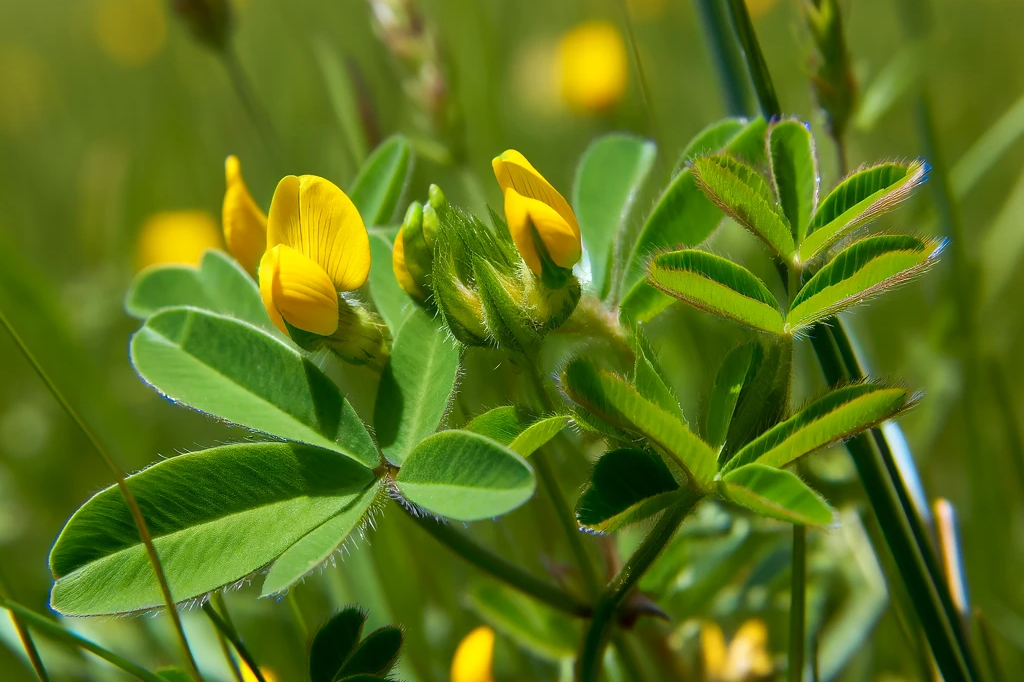Sainfoin

What is sainfoin?
Sainfoin (Onobrychis viciifolia) is a forage plant from the papilionaceous family that is particularly suitable for horses and ruminants. It has a high content of protein, crude fiber, calcium, vitamins, beta-carotene and trace elements. It also contains condensed tannins, which have an anti-flatulent, vermifuge and mucous membrane-protecting effect.
In the past, sainfoin was often fed as hay, but lost importance due to competition from alfalfa. Today it is being rediscovered as a valuable supplementary feed for animals with digestive or metabolic problems.
What are the benefits of sainfoin for dogs?
Sainfoin can help dogs suffering from the following complaints:
- Flatulence
- Diarrhea or watery stools
- worm infestation
- Lack of protein or calcium
- Emaciation or poor condition
- Allergies or skin problems
The condensed tannins in sainfoin combat flatulence by reducing gas formation in the intestines. They also protect the mucous membranes from irritation and infection by reducing the secretion of the mucous membrane glands and attacking the cell wall proteins of parasites. They can therefore also contribute to the prevention or treatment of worm infestations.
The proteins in sainfoin are rich in essential amino acids that dogs cannot produce themselves. They are important for the development of muscles, skin, hair and immune cells. The crude fiber in sainfoin promotes intestinal motility and the elimination of toxins. The calcium in sainfoin is organically bound and therefore readily available for bone formation and tooth development. The vitamins, beta-carotene and trace elements in sainfoin support the function of the eyes, skin, coat and nerves.
Sainfoin is therefore a superfood for dogs that can improve their health and vitality.
How do you feed sainfoin to dogs?
Sainfoin is available to buy in various forms, for example as dried herb, as pellets or as cobs. The cobs are pressed rings of sainfoin herb that need to be soaked before feeding. The pellets are smaller and do not need to be soaked. The dried herb can be mixed directly into the feed or brewed as a tea.
The amount of sainfoin you can feed a dog depends on its size, weight and state of health. The following amounts per day can be used as a guide:
- Small dogs (up to 10 kg): 10 to 20 g
- Medium dogs (10 to 20 kg) : 20 to 40 g
- Large dogs (over 20 kg) : 40 to 80 g
These quantities can be adjusted according to requirements. It is advisable to start feeding sainfoin slowly and observe how the dog reacts to it. Some dogs may experience a temporary increase in stool volume, but this is no cause for concern.
Sainfoin is a plant with many positive properties for the nutrition and health of dogs. It can counteract flatulence, diarrhea, worm infestation, protein or calcium deficiency, emaciation or allergies. Sainfoin is available in various forms and can be used as a supplementary feed or as a remedy. Sainfoin is a superfood for dogs that you can treat your four-legged friend to.
If you notice any signs of hypersensitivity or poisoning in your dog, you should see your vet immediately. We are not a substitute for a vet, but we try to be as accurate as possible. Every dog reacts differently and we recommend you get a second opinion or consult your vet if in doubt.
Stay healthy and take good care of your four-legged friend!😊
Similar to Sainfoin
Alfalfa (Medicago sativa) is a perennial plant from the legume family. It is also known as alfalfa or perennial clover. Alfalfa has long roots that can reach up to four meters deep into the soil....
Clover is a legume that belongs to the papilionaceous family. There are around 300 different types of clover, which vary in shape, color and size. The best known are white clover and red clover,...
Caution: Sweet pea is poisonous to dogs! Although vetch is edible for humans and some animals, it is very dangerous for dogs. The plant contains the toxic substance vicin, which can lead to severe...
Common clover, also known as Lotus corniculatus, is a perennial plant that belongs to the legume family (Fabaceae). It is widespread in many parts of the world and prefers to grow in meadows,...



